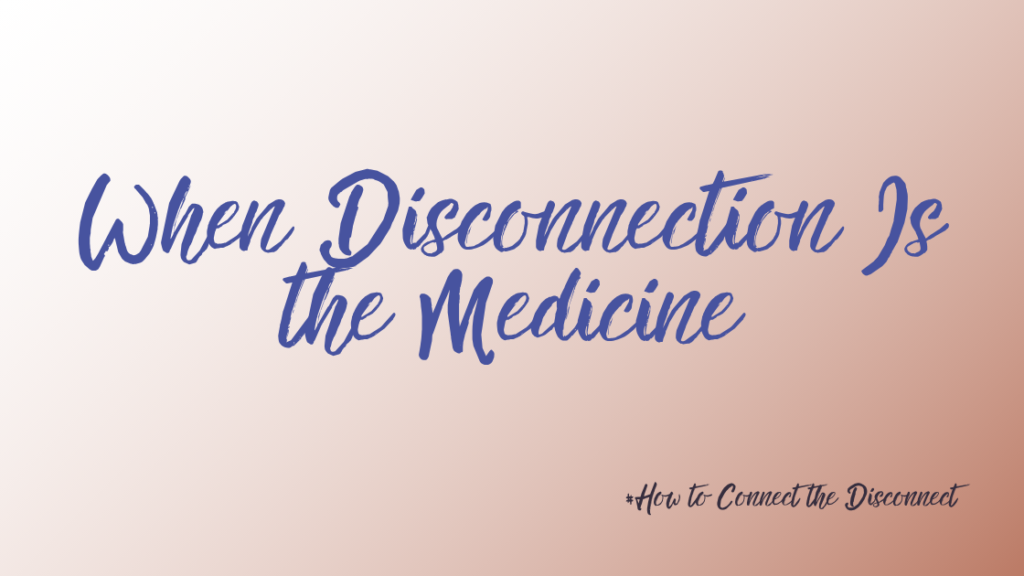When Disconnection Is the Medicine
I get the sense that disconnection has a bad rap in spiritual spaces. It’s often framed as a wound to be healed, a failure to be corrected, or evidence that someone has “fallen off the path.” But what if that’s just another polite fiction we tell ourselves to avoid the discomfort of genuine discernment? What if that’s just another way we keep ourselves trapped?
Disconnection isn’t always a problem. Sometimes, it’s the medicine.
Defining Disconnection
Let’s be clear about what is meant by disconnection. It is a sense of isolation and detachment or separating and distinguishing one thing from another. Disconnection is a kind of connection, one where there is more space, distance, or boundaries. We talk about disconnection in casual conversation. We might say that we are disconnected from people, the internet, media, or a religion. We can even feel disconnected from ourselves.
Yes, disconnection can feel like grief, loneliness, or numbness. But it can also be fierce clarity, healthy boundaries, or the liberation of finally saying, “No more.” In a world full of toxic positivity, superficial “dharma” teachings, and spiritual codependence, disconnection can be a radical act of sanity.
You can’t have interdependence or interconnection without disconnection. If everything were one giant blur of connection, there would be no boundaries, no discernment, no space—and therefore, no meaningful relationships. Interdependence isn’t sameness. It’s the dance between connection and distinction. Without some measure of disconnection and differentiation, interdependence becomes fusion or enmeshment.
Letting Go to Heal
Disconnection isn’t inherently broken. What’s broken is our relationship with it. And healing isn’t about stitching everything back together—especially not the parts of ourselves or our communities that need to be released. Healing is about learning to see clearly what nourishes and what poisons, what’s worth keeping close and what needs to burn.
Not every rift needs to be repaired. If you’ve walked away from a harmful belief system, an abusive relationship, a spiritually bypassing community, or your own self-abandoning habits—that’s not a failure to be fixed. That’s a victory. That’s a blessing. That might even be your inner rebel Buddha knocking at the door.
The dharma has never been about pleasing people. It’s about waking up. And waking up can mean walking away.
On the Path
On the Buddhist path, we’re constantly practicing connection and disconnection. We connect with wisdom and compassion. We disconnect from ignorance, ego-clinging, and performative spiritual nonsense. In the vajrayana, we connect with the luminous awareness that is the nature of our own mind, and we cut through the adventitious stains that obscure it. If that’s not disconnection, what is?
In the most positive sense, we may disconnect from the habit of treating our spiritual path as a race to be won, an identity we assume, or a mask we hide behind. We may disconnect from false friends and their shallow kindness. We may disconnect from an addiction, an abuser, or a damaging relationship. We may also disconnect from a corrupt familial, political, or religious system.
Disconnecting doesn’t mean you don’t care about or are abandoning someone. This is a mistaken belief that can perpetuate a cycle of suffering and abuse. We may believe if we disconnect, set boundaries, or even cut all contact that we have somehow failed or are not being kind. This misunderstanding is something toxic people and systems intentionally exploit in order to maintain control. Guilt and shame are their weapons. If we internalize this, we become trapped by a mistaken idea of kindness. At times, even the Buddha set boundaries or walked away. You can too.
Discernment
It is empowering and liberating to realize that loving something or someone doesn’t mean we have to continue to be drained, manipulated, or hurt. Many of us love people, ideas, things, and communities even when we know that their presence in our lives is damaging. Maintaining a harmful connection out of guilt or a misplaced spiritual obligation only causes more pain. It is not liberative. It is not loving. It is not kind.
When we see with genuine discernment that the presence of something or someone in our lives is not healthy, no matter how much time or energy we may have invested in it, that is the time to kindly disconnect. We can set simple, clear boundaries or even walk away completely, using our wisdom to know what is most skillful. Disconnecting doesn’t need to be indifferent, hateful, or resentful. It can be clear, calm, and compassionate. It can be matter-of-fact and drama-free. It requires no justification or explanation. “No” is a complete sentence.
Disconnecting can be the wisest and most compassionate thing we do. Disconnection can be the medicine we need to heal. Healing often doesn’t maintain the status quo. Sometimes, healing looks like letting the whole thing fall apart. And in that space, there is freedom.
Contemplative Exercise
Reflect on Your Connections
- Take a moment to list the people, ideas, habits, and communities you are currently connected with.
- Which ones nurture and empower? Which ones harm or ensnare?
- Which are based on fear, guilt, or obligation rather than love or truth?</li
Reflect on Your Disconnections
- Consider the beliefs, habits, things, people, or groups you have distanced yourself from.
- Which of these disconnections are healing, empowering, or protective?
- Are there places where you’ve cut off too much—maybe even within yourself?
Practice Fierce Discernment
- Choose one connection that needs to be released or radically redefined.
- Ask: What does letting go with sanity look like?
- Choose one disconnection that’s become a wound or a wall.
- Ask: What would reconnection look like if it came from wisdom and love, not guilt or fear?
Take One Bold Step
- Don’t make this theoretical. Write down one action—just one—to sever or to reconnect, with full awareness.
- Take the leap. Put it into action. What happens?

Ben is a dharma practitioner living in Colorado who enjoys being in nature.






